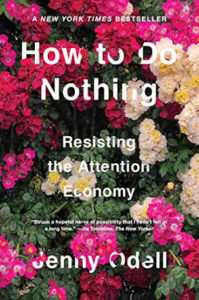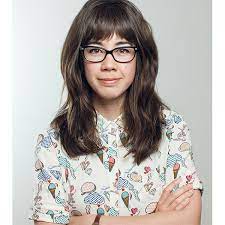
How to Do Nothing
By Jenny Odell
256 pages
Published April 9, 2019 by Melville House
I’m not sure how I came to read this. It was on my audiobook file. I turned it on accidentally, and then was intrigued by the subtitle. So, I gave it a shot.
I’m about halfway through it now. And I have a theory about how it got onto my audiobook file. It is the sort of book, like The Maid (reviewed here on Feb. 25), that is destined for success. Topically interesting. Politically correct. And lush with complex sentences.
In fact, it was one of President Obama’s “Favorite Books of 2019.”
Unfortunately, the complexity is mostly in its literary style. The thought content is wide, but not deep. The analysis is superficial. The fundamental perspective is anti-capitalist, in the most unexamined way. And the solution it offers – dropping out while still caring (by staying anti-capitalist) – well, it’s only helpful for people who, like the author, make their living as entertainers or educators.
What I Like About How to Do Nothing
* Odell admits that she is speaking from a privileged position and that “not everyone” can get paid good money to do the sort of thing she’s doing.
* She is right in saying that we can and should “refuse calls for our attention that do not serve us and reclaim our attention, directing it towards people and places and activities that we personally value.”
What I Don’t Like
As I said, I haven’t finished the book. I don’t know if I will. That’s because my “don’t likes” outweigh my “likes.”
* Her analysis of the “problem” – capitalism – is inexcusably naïve, even for a university teacher. Her view of what’s wrong with the world today? “The colonization of the self by capitalist ideas of productivity and efficiency” and this idea that “we should all be entrepreneurs.”
* Her remedy to the problem: Refuse to do any sort of work that you don’t want to do. Find a job, such as teaching performance art, in a good university or become a writer.
Two examples from the book on how to refuse the demands of attention economy and “do nothing”: (1) Diogenes, whose contribution to philosophy consisted of walking backwards and other exhibits of performance art. And (2) Bartleby the scrivener, Melville’s lovable dope who, whenever asked to do a simple job, replied, “Thank you, but I prefer not to.”
Critical Reception
How to Do Nothing was named one of the best books of the year by many critics, including those from Time, The New Yorker, NPR, GQ, Elle, and Fortune.
* “A complex, smart and ambitious book that at first reads like a self-help manual, then blossoms into a wide-ranging political manifesto.” (Jonah Engel Bromwich, The New York Times Book Review)
* “Approachable and incisive…. The book is clearly the work of a socially conscious artist and writer who considers careful attention to the rich variety of the world an antidote to the addictive products and platforms that technology provides…. [Odell] sails with capable ease between the Scylla and Charybdis of subjectivity and arid theory with the relatable humanity of her vision.” (Nicholas Cannariato, The Washington Post)
* “An erudite and thoughtful narrative about the importance of interiority and taking time to pay close attention to the spaces around us.” (Annie Vainshtein, San Francisco Chronicle)
About Jenny Odell

Jenny Odell is an artist, writer, and educator based in Oakland, CA. In 2015, she started an organization she called The Bureau of Suspended Objects. She was then “artist-in-residence” at Recology SF, a.k.a. the San Francisco dump. Her “work” there, which consisted of scavenging, photographing, and detailing the histories of objects that had been thrown out, culminated in an exhibition and archive intended to bring attention to the resources involved in the objects’ production and consumption.
Click here to watch Odell discussing How to Do Nothing.
